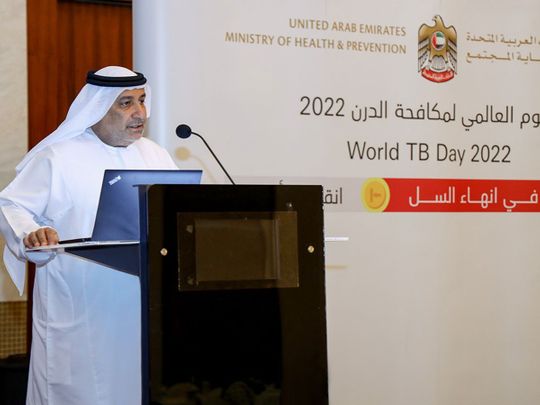
Dubai: In commemoration of World Tuberculosis (TB) Day, which was observed on March 24 under the theme ‘Invest to End TB, Save Lives’ the Ministry of Health and Prevention (MoHAP) organised a scientific seminar for the workers in the National TB Control Programme and health care providers nationwide.
As many as 350 persons took part in the event. The seminar was opened by Salem Al Darmaki, Advisor to the Minister of Health and Prevention, while Dr. Nada Al-Marzouqi, Director of the Department of Public Health and Prevention, made a presentation on the National TB Control Programme and its strategies to control TB. She also presented some analytical statistics on the achievements made by the programme.
Local and international experts and speakers who took part in the event discussed the latest recommendations of the World Health Organisation (WHO) in the field of healthcare for tuberculosis patients.
The challenges in dealing with the disease were also discussed, in addition to reviewing studies and statistics that illustrate the global and local situation.
Dr. Hussain Abdul Rahman Al Rand, Assistant Undersecretary for the Public Health Sector, said the UAE is one of the countries with low TB prevalence, and that the ministry continues to cooperate and plan with health authorities when it comes to conducting scientific research and finding the best solutions and medicines to end TB by 2030.
Al Rand pointed to the participation of the UAE in the Eastern Mediterranean regional strategy to eradicate tuberculosis in the region. The ministry has implemented, in collaboration with the health authorities and its strategic partners, several preventive strategies and programmes to reduce and control the spread of the disease, such as standardisation of surveillance methods and treatment systems, provision of tuberculosis drugs on a regular basis, giving preventive vaccination to children at birth, and the programme of early TB testing.
“The ministry has been organising numerous awareness and communal activities and programmes to promote awareness among various segments of society about tuberculosis, and encourage early diagnosis to avoid the disease and its complications,” said Al Darmaki. “The ministry is keen to provide the latest efficient preventive and curative health systems at all levels, follow up on effective measures that ensure control and prevention of the disease, and develop preventive strategies and plans to raise and spread societal awareness.”











